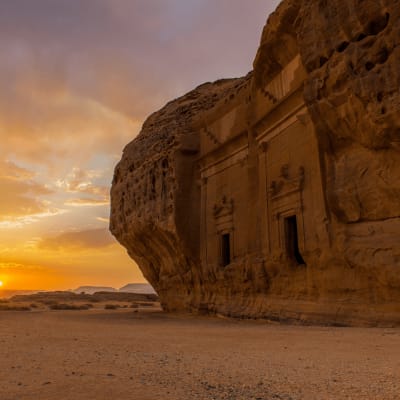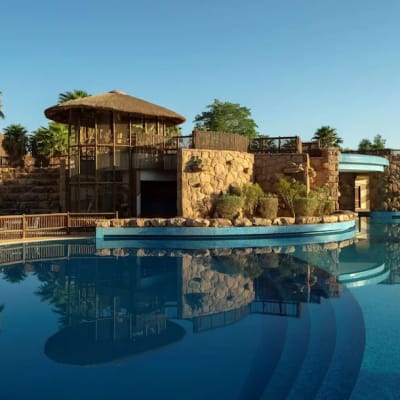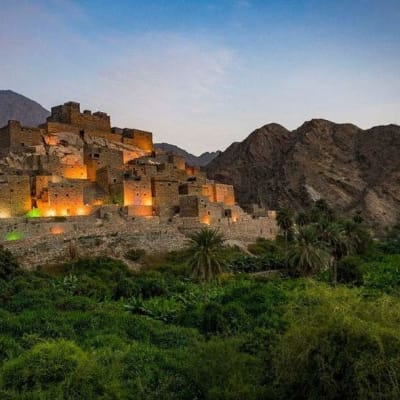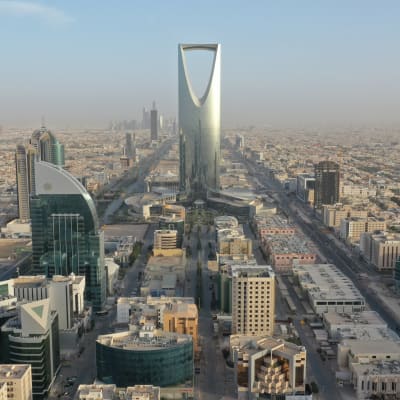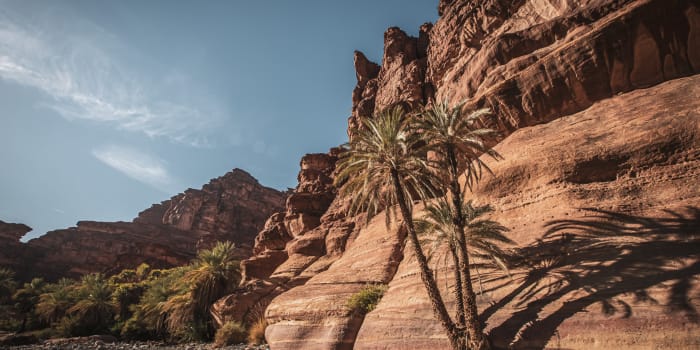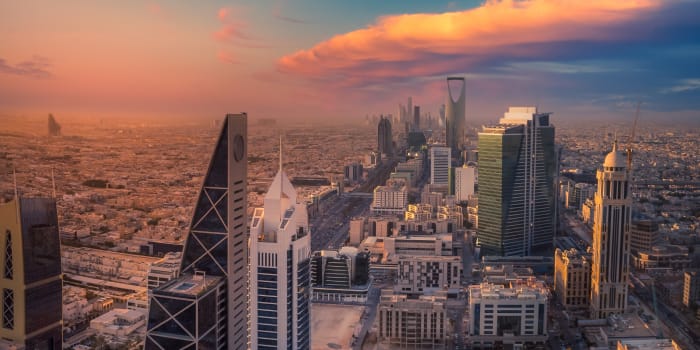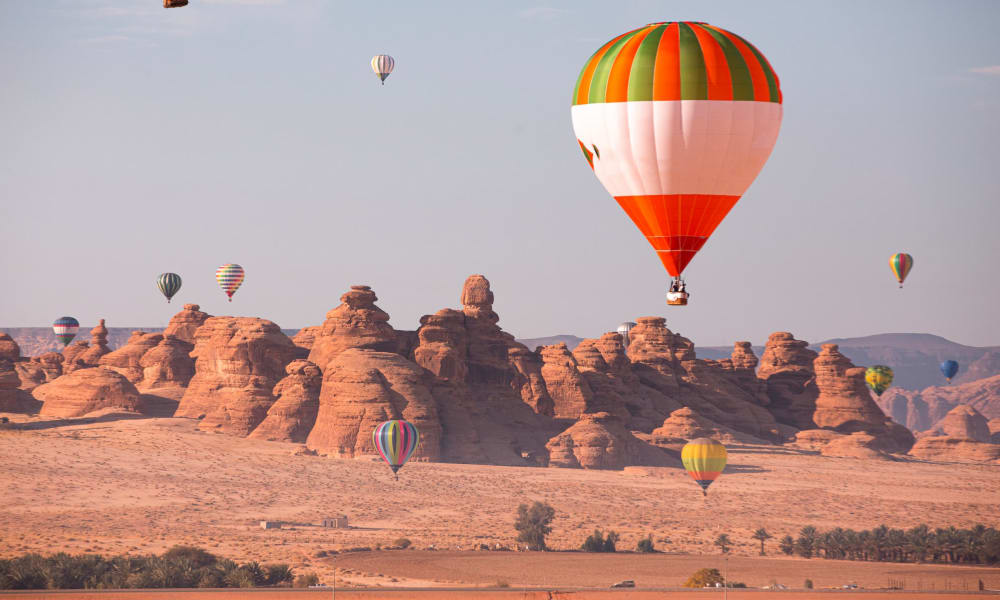
Travel Saudi Arabia
Escape the cold winter, extend the summer, or simply quench your seething thirst for adventure: Experience Saudi Arabia in all its diversity. Discover the millennia-old history and culture of the Arabian Peninsula. To make your trip a very special highlight, we will be happy to present you with various options. We create your individual dream holiday - from your personal preferences paired with our local experience.
Our Saudi Arabia Tours
We are happy to customize any trip to your wishes and ideas. The following trips are just examples of how a trip could look like.
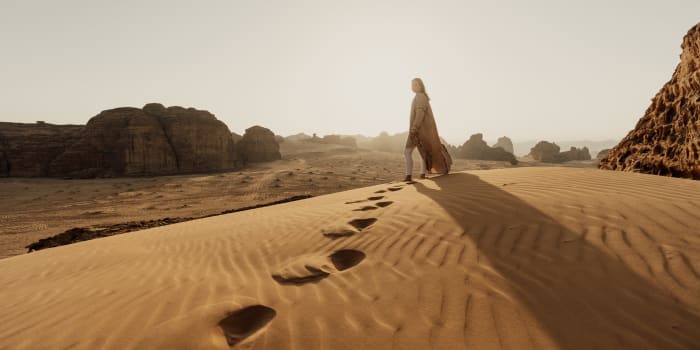
- Price: on request
- Duration: from 11 days
- fascinating insights into Jeddah's long and cosmopolitan past
- historical places and rock tombs of AlUla
- Experience Wadis and the "Grand Canyon of Saudi Arabia
- fascinating insights into Jeddah's long and cosmopolitan past
- historical places and rock tombs of Al'Ula
- Experience Wadis and the "Grand Canyon of Saudi Arabia
- Riyadh: birthplace of modern Saudi Arabia, where old-world charm meets 21st-century vision
- UNESCO World Heritage and Historical Site in AlUla Region
- Jeddah: The port city on the Red Sea delights with its ancient history
- Fascinating contrasts: between colorful souks, bustling alleys and gigantic construction projects
- Exploring the birthplace of Saudi Arabia Riyadh
- Tradition and modernity united in the two cities
- Visit palaces and rose farms in Jeddah
Why your next trip should go to Saudi Arabia
It has only been possible for vacationers to travel to Saudi Arabia since 2019. Those who prefer to explore countries away from the tourist crowds should seize the opportunity now. Saudi Arabia surprises in many ways: rough landscapes with bizarre rock formations, relics from ancient cultures and, right next to them, visionary buildings. Whether Riyadh, Jeddah, Mecca or Medina: the mysterious desert state awaits you. Look forward to your personal journey into a strange but incredibly hospitable world.
Popular luxury hotels in Saudi Arabia
Our aim is to make your trip to Saudi Arabia a very special experience. In addition to a colorful daily program, one thing counts above all: feeling good. After an eventful day, there is hardly anything better than ending the evening in an oasis of well-being: Delicious, authentic food, wellness and a feather-soft bed that sends you off to the land of dreams. Which hotel you choose is, of course, entirely up to you. To help you choose, here are the most popular luxury hotels in the country.
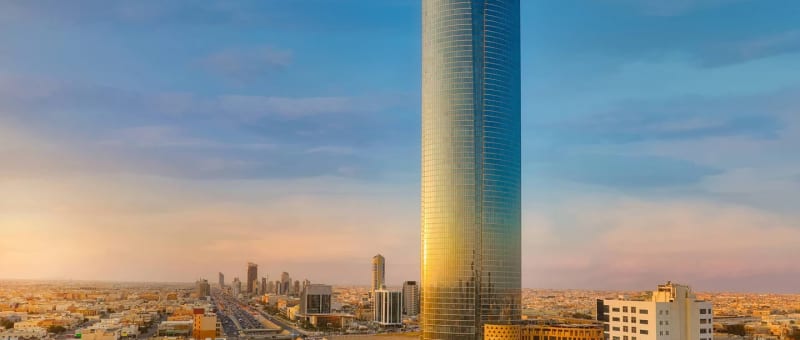
Hotels in Riad
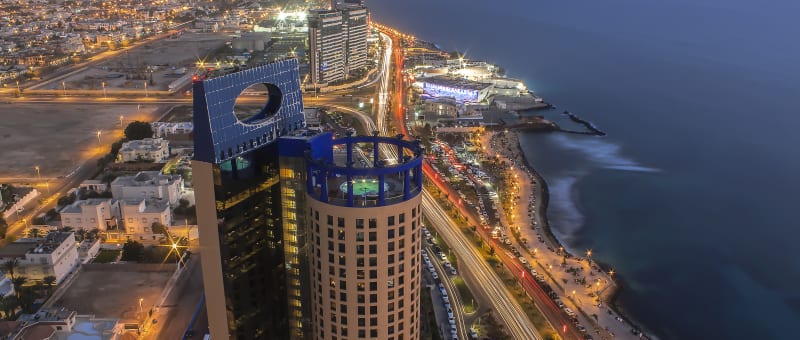
Hotels in Jeddah
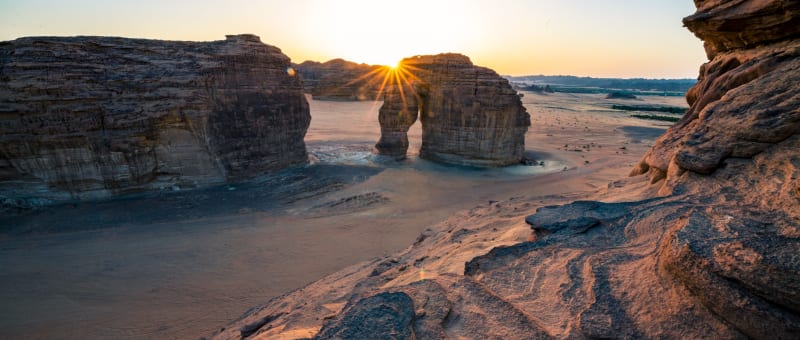
Hotels in Al'Ula
What to look forward to on your Saudi Arabia trip
Only dry desert, sand and heat? No way! In fact, you can also enjoy a pleasant sea breeze in Saudi Arabia and benefit from great beaches, water sports and cruises. Those interested in culture will also get their money's worth in Saudi Arabia. Travelers will discover a world that few people have ever seen. The desert state, which until recently was not even accessible to tourists, has countless surprises in store.
Saudi Arabia beaches
Fine white sand and turquoise blue water are not only found in the Far East. Saudi Arabia has some dream beaches to offer on the Red Sea, for example Haql on the Gulf of Aqaba and Farasan Al Kabir on a group of islands in the southwest. There are also popular beaches on the Persian Gulf, such as Uqair or Half Moon Beach south of Dammam.
Not every beach in Saudi Arabia is open to men and women. You are also only allowed to wear a bikini on designated beaches. Therefore, find out in advance what regulations apply at your destination.
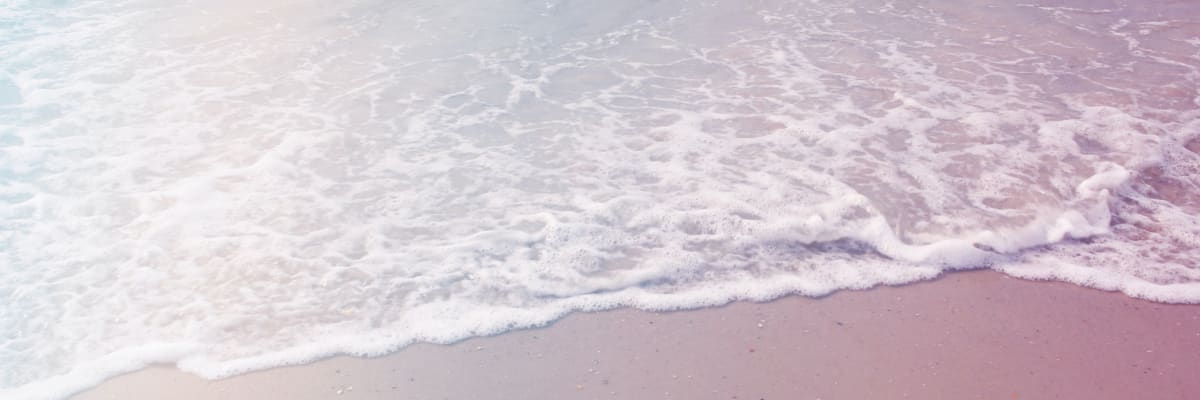
Sports: activities in nature
For those who want to escape the stressful everyday life and just relax, Saudi Arabia with its exclusive resorts is just right! But the royal state offers travelers not only an oasis of tranquility, but also - if desired - numerous sporting activities in nature. Doing sports and getting to know the beauty of the country better: This way you kill two birds with one stone. And maybe you would like to try something completely new? The choice is great!
Diving
Snorkeling
Hiking
Tip
The island of Jabal Al Laith, located about 200 kilometers from Jeddha, is the main breeding ground of whale sharks and one of the most picturesque dive sites in the country - Also because the crystal clear water ensures optimal visibility.
Zip lining
Horse riding
Mountain Biking
Climbing
Kayak, Parasailing, Kite-Surfing
Sandboarding & Sledding
Museums, art and culture
Tauchen Sie in Saudi-Arabiens faszinierende und weit zurückreichende Geschichte ein. Begeben Sie sich auf Spurensuche und erfahren Sie mehr über die Anfänge des geheimnisvollen Wüstenstaats. Museen, die Geschichts- und Kulturinteressierte während ihrer Saudi-Arabien-Reise unbedingt besuchen sollte, sind folgende.
National Museum of Saudi Arabia
WHERE. In Riyadh, the country's capital
SPECIAL FEATURES: The museum takes you on a journey into Saudi Arabia's past - in an interactive and entertaining way. In addition to historical aspects, the focus is mainly on works of art! The modern museum building covers 28,000 square meters.
Tayebat Museum
WHERE. In Jeddah
SPECIAL FEATURES: As an ancient port city, Jeddah occupies a central role in Saudi Arabia's history. Travel back 2,500 years and learn how Jeddah and the entire kingdom came to be in the first place. The architecture of the museum alone is worth seeing: the entire building is decorated with ornate stone and wooden ornaments.
King Abdulaziz Center of World Culture
WHERE. In Ithra
SPECIAL FEATURES: This cultural center, also called "Ithra," has become a Saudi landmark and is considered a sensation worldwide. What is exhibited there? Kind of everything. Inside the special rock building, you'll find a museum, a theater, a cinema, a library, several art galleries, a knowledge tower and an ideas center. You can spend at least a whole day here!
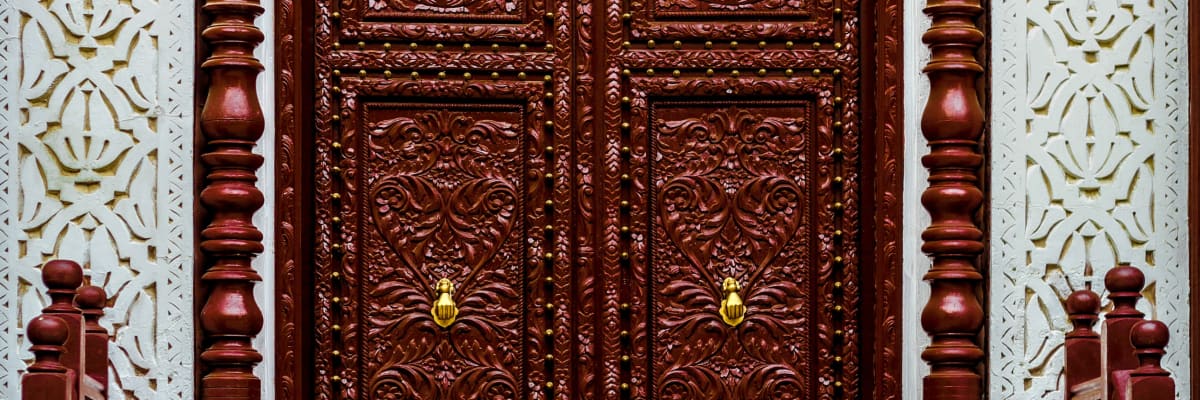
Saudi Arabia has a lot to offer not only for those interested in history. The desert state also has an impressive art scene that is constantly expanding. Art lovers can look forward to countless galleries and events. The following two places are popular, for example.
The Art Promenade of Jeddah
A stroll along Jeddah's "Art Promenade" is worthwhile in every respect: the path is lined with creative sculptures, and here and there pretty and thoroughly exquisite cafés, restaurants and cocktail bars invite you to linger. What could be better than high-quality art, first-class delicacies in your belly, and the sound of the waves in the background?
The cubes Maraya
In the middle of the Saudi desert in Al'Ula stands a large glass cube called Maraya, which means "mirror" in Arabic. The cube reflects the desert landscape, which has a surreal effect and has become a popular photo spot. But the inside of the cube is also worth a visit! Here, for example, concerts and theater take place.
By the way: Jeddah is basically a highlight for art fans! The entire city surprises with sculptures on various corners - there are 400 pieces in total!
Popular celebrations and festivals in Saudi Arabia
In recent years, Saudi Arabia has become a colorful cultural center that surprises with countless events. If you travel through the desert state, you should definitely attend one or the other celebration!
Saudi-Arabien hat sich in den letzten Jahren zu einem bunten kulturellen Zentrum entwickelt, das mit unzähligen Events überrascht. Wenn Sie durch den Wüstenstaat reisen, sollten Sie unbedingt der ein oder anderen Feierlichkeit beiwohnen!
Riad Art
Yanbu flower festival
Janadriya Cultural Festival
Curises
The Red Sea is a popular destination for cruises. Since the opening of Saudi Arabia, the kingdom has become a popular cruise destination, along with countries such as Egypt and Jordan. Touring Saudi Arabia by ship is the ideal solution for those who want to get around a lot and still relax: The cruise liners on offer call at a wide variety of regions and cities and provide pure luxury, wellness and culinary delights on board.
Sights
In addition to museums, art exhibitions and festivals, Saudi Arabia has numerous sights to offer you a glimpse into the country's diverse culture. The list is almost endless. The following attractions provide just a teensy taste.
Fort Masmak
At this fortress in Riyadh, built in 1865, you can immerse yourself in the turbulent history of Saudi Arabia.
Murabba Palace
The former royal palace in Riyadh nowadays houses a museum that gives you an insight into the modern history of the country. It is especially worth visiting in winter, as the extensive gardens are particularly green at this time of year.
Al-Rahma Mosque
The "floating mosque" is one of the landmarks of the city of Jeddah. The airy courtyards are worth a visit and are also accessible to non-Muslim tourists.
Jeddah Tower
The construction project in the north of the city of Jeddah was supposed to be the tallest building in the world at 1,007 meters. However, construction was halted in 2018 and has not yet resumed. However, looking at the tower in its current state of construction is also worthwhile!
Heritage Village
Those interested in culture will get their money's worth in this center in Dammam: from a museum to a handicrafts market to excellent restaurants, the Heritage Village lacks nothing.
Prophet's Mosque
The second largest mosque in the world and the second most important shrine to Islam in Medina is closed to non-Muslims. But with its ten minarets and green dome over the tomb of the Prophet Mohammed, it is impressive even from the outside.
Important: For religious reasons, non-Muslims are forbidden to visit the holy sites of Islam. However, many mosques now allow access to courtyards and other public areas. So before you visit, find out what is allowed on site.
Unesco World Heritage Sites
Saudi Arabia boasts a proud six UNESCO World Heritage Sites that are definitely worth a visit!
Stone City of Hegra
Just like its Jordanian counterpart Petra, the former Nabataean city impresses with ancient facades and tombs. The circular structures were built between 100 B.C. and A.D. 100 on a former trade route.
At-Turaif in Diriyya
The historic district of Diriyya, located northwest of Riyadh, is considered the cradle of the first Saudi dynasty. It is worth exploring the sprawling mud-brick buildings together with a guide.
Historic Jeddah
The old city of the port city of Jeddah, with its characteristic wooden facades, was listed as a UNESCO World Heritage Site in 2014. The architecture combines vernacular elements with international influences from brisk trade.
Rock art in the Ha'il region
Around the city of Ha'il, rock paintings bear witness to a former oasis and wadi (desert riverbed). Some of the inscriptions are up to 10,000 years old.
Al-Ahsa Oasis
The largest oasis in the world includes not only an elaborate irrigation system, archaeological sites and historic buildings, but also more than two million date palms.
Cultural area of Hima
The rock inscriptions in the province of Najran, which are up to 7,000 years old, are witnesses to an ancient trade route. You can admire here not only pictorial representations, but also various Arabic, Nabataean and even Greek writings.
Desert
Saudi Arabia is multifaceted and has much more to offer than is commonly known. No wonder: The country has been undergoing rapid change since the doors were opened to travelers. However, Saudi Arabia's sprawling deserts, which take up around 60 percent of the country, are and remain particularly fascinating:
Canyon "Edge of the World"
From a 300-meter cliff near Riyadh in Jebel Fihrayn Canyon, enjoy the spectacular view over a prehistoric sea bed.
Al-Ula Oasis
This ancient oasis town on the former Frankincense Road is one of many ambitious projects to promote tourism in Saudi Arabia. A desert city is being built around the rocks of Hegra, which is expected to become an international tourist magnet in the future.
Rub al-Chali
The "Empty Quarter" is located in southern Saudi Arabia and, with an area the size of Turkey, is considered the largest contiguous sand desert on earth.
Nefud Desert
The desert in the north of the country was a water-rich green landscape in the Stone Age, which is why many settlers settled there. Even today, their traces can be found in numerous archaeological sites, such as the Ha'il region.
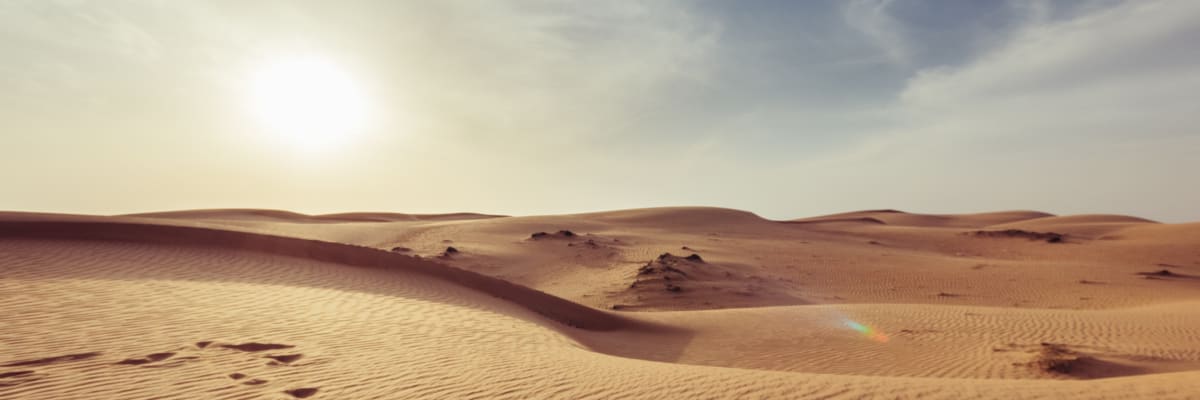
Asir Mountains
A popular destination for excursions is the Asir Mountains. The ancient Frankincense Road - one of the oldest trade routes in the world - runs through Asir, which is why there are numerous historic settlements to marvel at here. Discover Saudi Arabia's southern architecture and get close to nature: Hiking and culture fans get both here.
Beware: The road up into the mountains is adventurous, but also quite winding - not a pleasure for everyone. Those with a head for heights can look forward to spectacular views and mysterious lost places. The numerous settlements and villages are no longer inhabited. However, the historic core is maintained! If you stroll through the alleyways here, you can mentally travel back to the old Saudi mountain village.
Entry to Saudi Arabia: airports in the country & tourist visa on arrival
If you would like to travel to Saudi Arabia, there are four international airports to choose from: * King Khalid International Airport in Riyadh * King Abdulaziz International Airport in Jeddah * King Fahd International Airport in Dammam * Prince Mohammad bin Abdulaziz International Airport in Medina A direct flight from Frankfurt am Main to Riyadh takes about six hours and - depending on the season and airline - is available from around 500 euros.
Visum bei Ankunft
Packing my suitcase: Saudi Arabia packing list
- Long-sleeved, non-flashy clothing - Saudi Arabia is an Islamic country, after all, and tourists should dress accordingly.
- Travel adapter (G-plug, 3 rectangular holes): If you are coming from Europe or the USA, you will need a travel adapter for Saudi Arabia. Adapters that also have USB ports are handy.
- Reusable water bottle:Plastic waste is a big problem in Saudi Arabia, and people love to buy small plastic bottles of water. Bring your own water bottle for the sake of the environment. Tap water is generally safe to drink.
- Good sunscreen: the Saudi sun is fierce and the dry heat combined with the sun can have serious consequences for your skin.
- A small Arabic dictionary: Communicating at least rudimentarily in the local language is a sign of respect and will be met with goodwill.

